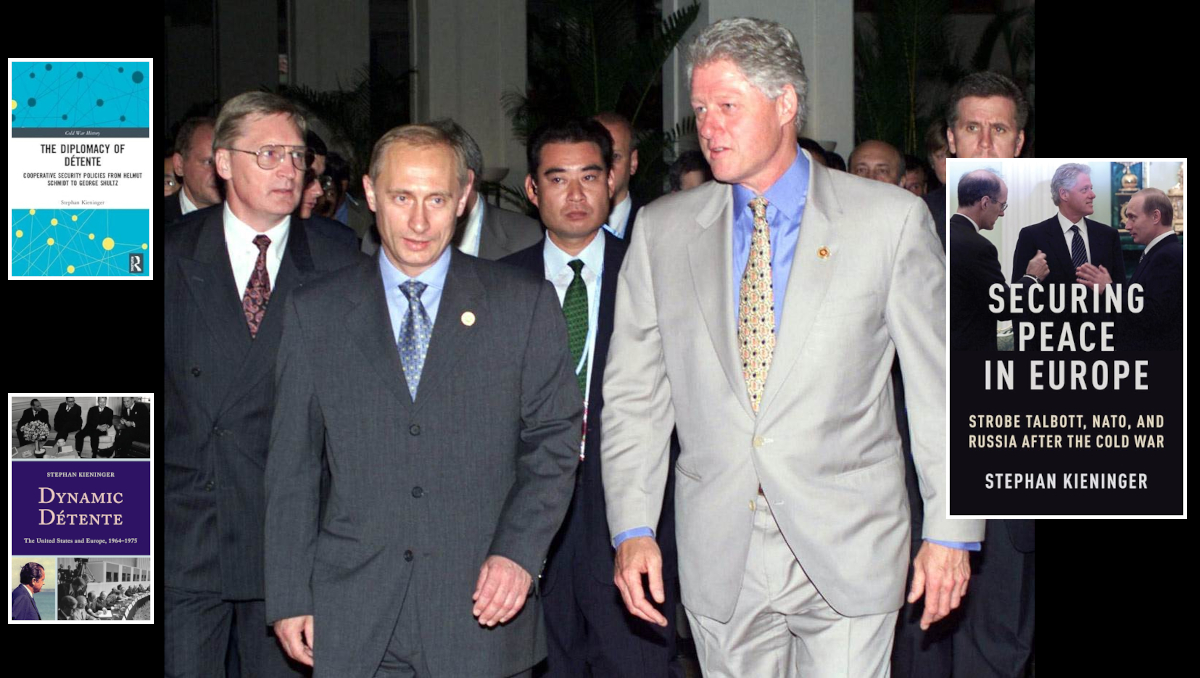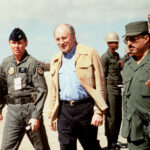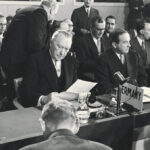
During the administration of President Bill Clinton, Strobe Talbott, a close friend and confidante, served as Deputy Secretary of State. Historian Stephan Kieninger joins podcast editor Ron Granieri to discuss his new book, Securing Peace in Europe: Strobe Talbott, NATO and Russia after the Cold War. Kieninger explains that Talbott consistently pursued both NATO enlargement and engagement with a reformed Russia, believing these two goals were not contradictory. The discussion highlights the differing approaches between the United States and Europe in engaging with Russia, a dynamic that continues to be relevant in current events.
NATO enlargement and engaging Russia was never a contradiction for him because he thought it was possible to square the circle and to envisage a partnership between a reformed NATO and a reformed Russia.
Podcast: Download
Stephan Kieninger is a Non-Resident Fellow at the American-German Institute and a former Global Fellow at the Woodrow Wilson Center. He is the author of Dynamic Détente. The United States and Europe 1964-1975 (Lanham 2016) and The Diplomacy of Détente. Cooperative Security Policies from Helmut Schmidt to George Shultz (London 2018) and his newest book Securing Peace in Europe: Strobe Talbott, NATO, and Russia After the Cold War (Columbia University Press 2025).
Ron Granieri is Professor of History and the Chair of the Department of National Security and Strategy at the U.S. Army War College and the Editor of A BETTER PEACE.
The views expressed in this presentation are those of the speakers and do not necessarily reflect those of the U.S. Army War College, U.S. Army, or Department of Defense.
Photo Description: Former U.S. President Bill Clinton with President Putin, Okinawa, Japan, 21 July 2000.
Photo Credit: Courtesy of the President of the Russian Federation and is licensed under the Creative Commons Attribution 4.0 License





The title of interviewee Stephan Kieninger’s book is “Securing Peace in Europe: Strobe Talbott, NATO, and Russia After the Cold War.”
But if the title of Stephan Kieninger’s book had been, instead, “Securing Modern Western Political, Economic, Social and Value Reforms in Europe: Strobe Talbott, NATO, and Russia After the Cold War,” then — by way of that exact such change —
a. Might not the U.S./the West’s post-Cold War transformative/reform efforts in Europe (to include NATO’s use of military force in these such efforts), thereby, become much more understandable? And, likewise,
b. Might the military and other efforts of certain other nations, in that AO, who chose to resist our such transformative/reform efforts, might these such efforts, also, become much better understood?
Example:
“As nations throughout the region sought to reform their economies, mitigate ethnic tensions, and broaden civil society, Belgrade seemed to delight in continually moving in the opposite direction. It is small wonder NATO and Yugoslavia ended up on a collision course. It was Yugoslavia’s resistance to the broader trends of political and economic reform — not the plight of the Kosovar Albanians — that best explains NATO’s war. Milosevic had been a burr in the side of the transatlantic community for so long that the United States felt that he would only respond to military pressure. Slobodan Milosevich’s repeated transgressions ran directly counter to the vision of a Europe ‘whole and free,’ and challenged the very value of NATO’s continued existence.” (At the bottom of Page xxii, and the top of Page xxiii, of John Norris’ [Communications Director for Clinton’s Deputy Secretary of State Strobe Talbott during the war?] book “Collision Course: NATO, Russia and Kosovo.”)
Bottom Line:
The words and concept of “securing the peace in Europe post-the Cold War,” these such words and concepts — then as now — do not seem to accurately reflect what is actually going on and why. Nor do they seem to help explain why both “we,” and “they,” might resort to military force — to achieve our separate, and indeed diametrically opposed, objectives. Whereas:
The words and concept of “securing modern western political, economic, social and value transitions/reforms in Europe post-the Cold” — these such words and concepts would seem to do a much better job in this regard?
As to the matters that I present above, might I also be so bold as to suggest that the title of this podcast might also be improved upon, for example, by changing it to: “The Eternal Task: Securing Modern Western Political, Economic, Social and Value Reforms in Europe?”
Note that the critical thing that must be understood from these such changes, this is that “peace” (which often requires compromise/the non-fulfilling of one’s transformative and/or reform goals/the acceptance of individual political, economic, social and/or value differences) this was not our post-Cold War political objective. Rather, our post-Cold War political objective was more in the realm of “transformative”/”reform” goals — a concept, thus, that readily (or should readily) acknowledge and accept that resistance (and conflict and war?) are often inevitable — and thus are to be planned and prepared for — for example, as explained in this excerpt from Joint Publication 3-22, Foreign Internal Defense. (Therein, see Chapter II, Internal Defense and Development, and Chapter 2, Construct):
“a. An IDAD program integrates security force and civilian actions into a coherent, comprehensive effort. Security force actions provide a level of internal security that permits and supports growth through balanced development. This development requires change to meet the needs of vulnerable groups of people. This change may, in turn, promote unrest in the society. The strategy, therefore, includes measures to maintain conditions under which orderly development can take place.”
Bottom Line: Post-the Cold War, “securing the peace,” in Europe and/or elsewhere, this was not our goal/this was not our political objective. Rather, “transformation”/”reform” was our goal/was our political objective. Accordingly, and as JP 3-22 above describes and acknowledges above, unrest, resistance, conflict and war should have been expected, and should have been planned and prepared for?